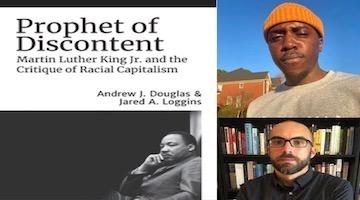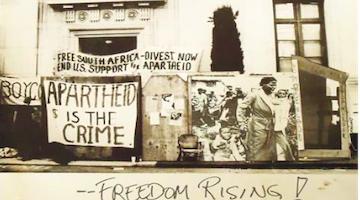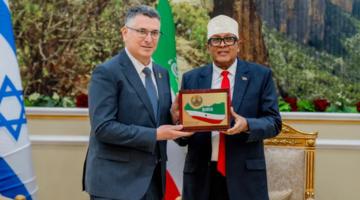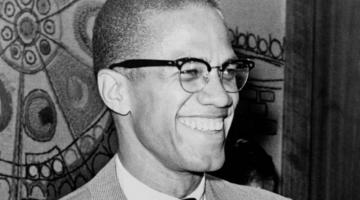Cornel West Vs. Coates: A Necessary Debate That Black Agenda Report Has Amplified Since Its Inception
“Coates has benefitted from the neo-liberal brand of Black leadership that grew in strength during the era of Obama.”
I began writing for Black Agenda Report over four years ago. As a "non-Black" identified person of color, Black Agenda Report's commitment to the Black Radical Tradition was an inspiration in a period marked by deep political reaction. Black Agenda Report did not betray its political principles in the face of the first Black President at a time when there was immense pressure to do so. Black Agenda Report not only provided a forum for Black left political thought and action, but also advanced necessary debates in service of movements for social transformation in the Black American community and oppressed communities worldwide. The conversation that has emerged from Cornel West’s critique of Coates is one that BAR has amplified since its inception and should not be left in the polluting grips of the Black political class and their white liberal allies.
Cornel West essentially outlined the political program of the Black Radical Tradition by exposing the political emptiness of Ta-Nehisi Coates. Coates has made exorbitant profit from book sales and articles for publications such as The Atlantic. His recent text, Eight Years in Power capitalized on the rise of Donald Trump in the aftermath of the Obama era. Coates has benefitted from the neo-liberal brand of Black leadership that grew in strength during the era of Obama. His work on reparations, white supremacy, and the Obama-Trump phenomenon has given him a bright national spotlight. However, with one article, Cornel West illuminated how Coates has done little more than build a comfortable career in place of genuine service to the masses of poor and oppressed people in the Black community and beyond.
“The conversation that has emerged from Cornel West’s critique of Coates is one that BAR has amplified since its inception and should not be left in the polluting grips of the Black political class and their white liberal allies.”
West’s intervention is not without a contextual basis. The history of Black political thought and action has always been rife with contested debate in the struggle to chart the correct path forward to substantive emancipation. Individual Black leaders and organizations have debated questions such as the viability of Black nationalism, the difference between civil rights and human rights, and the role of socialist ideology in the Black freedom movement, to name a few. These debates were products of concrete struggle over the trajectory of the Black polity. They provided much needed clarity for the advancement of Black liberation.
Yet when West made clear that Coates’ inability to challenge Wall Street and War was a rebuke of the Black Radical Tradition, there were many who quickly sought to distance themselves from the substance of West’s position. West was channeling W.E.B. Du Bois, Fannie Lou Hammer, Claudia Jones, Malcolm X, and the Black Panther Party when he challenged Coates’ much-heralded body of work. What Black Agenda Report calls the Black political class has never wanted anything to do with these stalwarts of the Black Radical Tradition. This was evident in the Guardian when it published responses to West’s critique from prominent Black academics and Black activists. Of the four interviewed, only one engaged with the substance of the debate. None openly took sides.
“West was channeling W.E.B. Du Bois, Fannie Lou Hammer, Claudia Jones, Malcolm X, and the Black Panther Party when he challenged Coates’ much-heralded body of work.”
West has received largely negative responses for his critique of Coates. His opposition to Wall Street and war is a fundamental threat to US imperialism and thus the patronage the system endows the Black political class. Criticism of West has centered on his so-called lackluster approach. Black Lives Matter network leader Patrisse Cullors claimed that the debate was "not definitive to our communities." One can only wonder how silencing Cornel West serves anything but the interests of the parasitic imperialist system that has subjected Black America to a state of precarity for centuries.
Perhaps the worst example thus far was published in an article in The Intercept. Infamous progressive Naomi Klein and Black Lives Matter leader Opal Tometi penned a statement that urged readers to forget about the West and Coates debate. The focus of our attention should instead be on the need to build a "multiracial" movement against the US empire. The piece lectures readers about the importance of fighting empire and war yet reduces West's arguments to "narrow nationalism." Sloppy organization and a lengthy word count do nothing but prove that the authors of the article had as their primary interest the erasure of the Black Radical Tradition in favor of a color-blind approach to organizing.
The Klein/Tometi piece lectures readers about the importance of fighting empire and war yet reduces West's arguments to "narrow nationalism."
There is no time to reduce West's criticism of Coates to foolish infighting. Rather than insulting West's critique as "not definitive" to our communities, we should be taking the time to learn from it. Internationalism has been a fundamental aspect of the Black Radical Tradition from the very outset of its development. Whether Coates has or hasn't addressed the questions of War and Wall Street throughout his illustrious career is not of primary concern. The concern is that his body of work is less reflective of the Black Radical Tradition and more so the perils of collaboration with imperialism. West questions Coates' commitment to the Black Radical Tradition by citing both a record of inaction on the questions of Wall Street and war and a tendency to align with the Obama wing of imperialism toward profitable ends.
These are questions that Black Agenda Report has placed on the forefront of discussion long before West applied them to Coates’ work. Black Agenda Report has been the only left political journal to consistently expose the Black political class and its role in the reproduction of imperialism’s exploitative social relations. Black Agenda Report is the lone Black left journal that provides both news and analysis on issues of war, racism, and capitalism. The Black Agenda Report team has given ample space for the people to learn from the political debate occurring in movements such as Cooperation Jackson. Editor Bruce Dixon has been digging through the archives to highlight Black Agenda Report as the only consistent voice when it comes to coverage of the US-led invasion of Libya in 2011 or the Black political class’ support for the demise of Net Neutrality.
“Black Agenda Report has been the only left political journal to consistently expose the Black political class and its role in the reproduction of imperialism’s exploitative social relations.”
West’s engagement with Coates is thus nothing new to either Black Agenda Report or the Black Radical Tradition from which it sprung. Black America has historically led the way in the revolutionary struggle against imperialism from inside “the belly of the beast.” Imperialism by its very nature has required the destruction of Black self-determination, the looting of wealth, and the denial nationhood to maximize the profits of capital. The struggle for Black self-determination has thus produced debates within Black leadership concerning the correct direction for not only Black people, but also for the entire human family. It is the duty of progressive and revolutionary forces in the US to take sides in such debates, not discourage them.
This writer decided to contribute to Black Agenda Report because the debate over the questions of war, Wall Street, and the Black Radical Tradition must be met with a revolutionary movement dedicated to the development of a new society free of exploitation. Black Agenda Report has shown time and again that it is committed to creating favorable conditions for such a movement to emerge. The Black left journal spends each week raising the people’s level of political development. Working class and oppressed people such as myself find this model attractive. In a moment where mass fear is as palpable as class war, the link between the battle of ideas and the struggle for a new world has become increasingly clear. Cornel West has consistently fought in both struggles. The same cannot be said for Coates.
Cornel West has taken the best from the Black Radical Tradition to raise important questions about the role Coates’s work plays in the future of humanity. Ta-Nehisi Coates was placed at the center of the critique but by no means did West single him out without purpose or strategy. Revolutionary ideas are the foundation blocks for the new world we seek. Black Agenda Report has amplified the ideology of the Black left reflected in West’s critique of Coates since the publication’s inception. War, racism, and Wall Street are interconnected phenomena that make up the skeleton of the class war before us. Cornel West has taken a side in this war and has challenged us to do the same, whether Coates responds to West or not.
Danny Haiphong is an activist and journalist in the New York City area. He can be reached at wakeupriseup1990@gmail.co



















